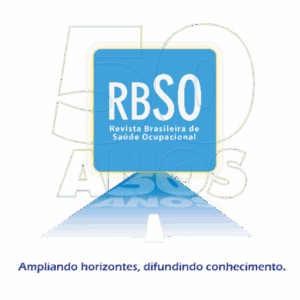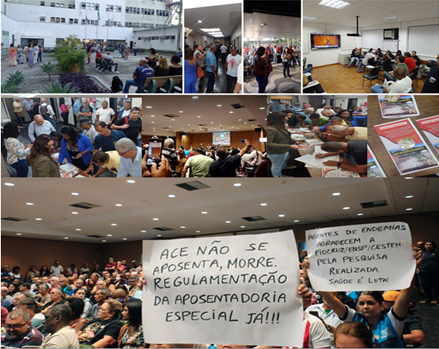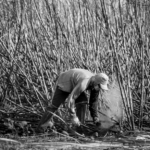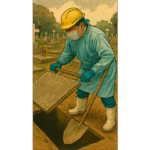Júlio César Lopardo Alves, Brazilian Journal of Occupational Health’s Editorial Management, São Paulo, SP, Brazil.
Tarsila Baptista Ponce, Brazilian Journal of Occupational Health’s Editorial Management, São Paulo, SP, Brazil.
 The interviewees – Ana Paula Neves and Ariane Leites Larentis – work in the “Multicentre integrative project: study of the impact on the health of vector control workers (VCW) due to exposure to pesticides (agrotoxics) in the state of Rio de Janeiro”, affiliated with the Center for Studies on Workers’ Health and Human Ecology (Cesteh/Ensp) at Oswaldo Cruz Foundation (Fiocruz), Brazil. The project involves multiple partner institutions as well as the endemic disease control agents themselves.
The interviewees – Ana Paula Neves and Ariane Leites Larentis – work in the “Multicentre integrative project: study of the impact on the health of vector control workers (VCW) due to exposure to pesticides (agrotoxics) in the state of Rio de Janeiro”, affiliated with the Center for Studies on Workers’ Health and Human Ecology (Cesteh/Ensp) at Oswaldo Cruz Foundation (Fiocruz), Brazil. The project involves multiple partner institutions as well as the endemic disease control agents themselves.
Ana Paula Neves is a PhD student in the Graduate Program in Public Health and Environment at Fiocruz. Ariane Leites Larentis is a researcher at Fiocruz and the coordinator of the “Multicentre integrative project: study of the impact on the health of vector control workers due to exposure to agrotoxics in the state of Rio de Janeiro”.
The researchers are among the authors of the essay The work process of vector control workers in Brazil from a critical perspective on the ideology of sustainable development, published in Volume 50 (2025) of the Brazilian Journal of Occupational Health/Revista Brasileira de Saúde Ocupacional (RBSO). The interviewees responded to the questions jointly, which address the struggle for vector control workers’ health and the importance of collaborative action between researchers and workers.
Could you tell us a little about the work process and the struggle for health of the vector control workers (VCW) in the state of Rio de Janeiro.
The vector control workers’ struggle has a long history, as told by the agents themselves: in the 1980s and 1990s, temporary hires and public exams were conducted for endemic disease workers in response to dengue and yellow fever outbreaks. However, despite the success of the campaigns, in 1999, workers were dismissed without notice, without labor rights – including worker safety and health protections and without social security coverage. The workers organized marches, political actions, peaceful occupations of public offices, and legal proceedings. In 2003, the Federal Regional Court of Rio de Janeiro ordered the Ministry of Health to reinstate the VCW. In 2006, the workers were officially appointed as ‘vector control workers’ under the Brazilian Consolidation of Labor Laws, and in 2014, they transitioned to the Single Legal Regime (Larentis, et al., 2021).
Most vector control workers perform, or have performed, duties involving direct contact with agrotoxics to ‘combat’ arbovirus vectors. Even after the regulation of their employment contracts, they continue to face violations of occupational health and safety rules, such as inadequate infrastructure at the temporary facilities used during campaigns—called support points—where agrotoxics and equipment are improperly stored and which are also used for workers’ rest, meals, and hygiene. In addition, they handle various toxic substances, often without personal protective equipment (PPE) or with PPE that is expired or past its replacement date due to a lack of supply by public authorities, insufficient training to carry out their activities, and the absence of proper periodic medical supervision (Neves, et al., 2025).
Some workers report that when they began fieldwork in the 1980s and 1990s, they were encouraged by their supervisors to drink a glass of water containing the organophosphate larvicide temephos (Abate®) in front of residents to prevent them from refusing the treatment in their homes, particularly in their water tanks. Without any information about the substances they were handling or the damage they could cause, the workers complied with the supervisors’ requests. Over time, they began to notice that some colleagues started showing symptoms of poisoning: allergies, weakened immunity, and respiratory problems. As the years went by, there were cases of impotence, infertility, fetal malformation, endocrine system disorders affecting the glands, ergonomic-related illnesses, neurological disorders, and cancer, in addition to the deaths of many young coworkers. They eventually realized the real possibility that the larvicides and insecticides they handled—most of them unaware that these were actually classified as agrotoxics —were the cause of the illnesses affecting them (Larentis, et al., 2021).
The first help was sought from the toxicology department of the Clementino Fraga Filho University Hospital at the Federal University of Rio de Janeiro (UFRJ), where the workers were welcomed by Dr. Heloísa Pacheco. Later, they received support from the Center for Studies on Workers’ Health and Human Ecology at Fiocruz, where significant progress was made with the creation, in 2018, of the ‘Multicentre Integrative Project: Study of the Impact on the Health of Vector Control Workers due to Exposure to Agrotoxics in the State of Rio de Janeiro’. The project became an important tool for systematizing data on illness and death, as well as for supporting ongoing legal and political efforts to recognize exposure and promote necessary changes in the work process of VCW.

Image: Via Fiocruz
Could you comment on the knowledge production method used in the essay, the Expanded Research Community (ERC)? What is the importance of the ERC for the field of Workers’ Health?
The project is situated within the field of Workers’ Health and draws inspiration from the Italian Workers’ Movement (MOI) (Oddone, et al., 1986) – which itself is rooted in Marxist principles – as well as from the experiences of Latin American Social Medicine. (Laurell, 1984). Accordingly, it was organized and operates from the perspective of an Expanded Research Community (ERC), based on the understanding that knowledge is constructed through the synergistic dialogue between different forms of knowledge: the technical-scientific and the experiential knowledge accumulated by workers in their daily activities, known as workers’ knowledge. Within the ERC, science is built dialogically between workers and researchers, seeking to break away from the socio-technical division of labor and to move beyond the approaches developed in traditional occupational health models.
Putting into practice the concept from the Italian Workers’ Movement that ‘to control, one must first of all know,’ the ERC is characterized by non-delegation—that is, knowledge construction begins with workers’ knowledge, since it is understood that no one knows the work process better than the workers themselves. The VCW participate in discussions, decision-making, and actions as main subjects, not merely as samples. They are active participants throughout the entire evaluation process—from assessing working conditions to proposing actions—developing research about their own reality. Weekly discussion forums are held with VCW, students, and researchers; workers take part in graduate students’ evaluation panels, contribute to the development of materials such as newsletters, technical notes, and scientific articles; and also participate in training courses (Oddone, et al., 1986).
How did the idea of criticizing the ‘ideology of sustainable development’ emerge from the work process of the VCW in the state of Rio de Janeiro?
The idea emerged from the immersion of the multicentre integrative project team in the concrete reality of the work process of the VCW, and from observing the complete contradiction between this reality and Brazil’s internal goals for meeting the United Nations 2030 Agenda and its 17 Sustainable Development Goals (SDGs). Vector control work, as a public health strategy, is directly related to several of Brazil’s national targets: reducing deaths and illnesses caused by hazardous chemicals such as agrotoxics; reducing human and environmental contamination and air, water, and soil pollution; supporting technological development and the elimination of neglected diseases and arboviruses transmitted by Aedes aegypti and other communicable diseases; ensuring adequate and equitable environmental sanitation and hygiene for all; improving solid waste management; guaranteeing universal and equitable access to safe and affordable drinking water for all; and ensuring access to decent, adequate, and affordable housing with basic services and urban infrastructure. If implemented, all these measures would act at the root—the cause—of the country’s high rates of vector-borne diseases, as they would eliminate the favorable conditions for the proliferation of vectors and the microorganisms that cause these diseases (Neves, et al., 2025).
With regard to work processes and workers’ health, one of the internal goals of the SDGs aims to ensure ‘decent work’ and the ‘reduction in the level of non-compliance with labor legislation’ concerning employment registration, working conditions, and occupational health and safety standards. However, we have found that the Brazilian reality on this matter stands in total opposition to the internal goals adopted. Based on Marx’s historical materialism as a theoretical foundation, we analyzed this contradiction and observed that Brazil, with an economy subordinated to the hierarchical globalized capitalism, occupies the position of a food and commodity-exporting nation, strongly grounded in agribusiness. Since 2008, Brazil has been the world’s largest importer of agrotoxics, including substances already banned in the Global North due to their harmful effects on human health and the environment, with carcinogenic potential. These products are used massively and indiscriminately in the country, both for agricultural production and for vector control programs. The economic reality of Brazil – a so-called ‘developing’ country – prevents it from advancing in improving urban infrastructure and the living conditions of its citizens and workers, who, like the vector control workers, face precarious working conditions and the denial of even their most basic rights, achieved through long and hard struggles, as previously described. Within the limits of the capitalist system, it is not possible to achieve sustainability or sustainable development (Neves, et al., 2025).
What is the importance of research institutions and scientific journals in the struggle for health of the VCW in the state of Rio de Janeiro?
By seeking to build a non-reductionist approach to science through the use of the Expanded Research Community (ERC), the development of research and publication in scientific journals primarily aim to support the workers’ struggle across all spheres: judicial, political, and scientific. As noted by Laurell (1984), science developed under capitalism, without subverting this logic, addresses the interests of dominated classes in a secondary, subordinate manner, since its main objective is aligned with the interests of the dominant classes. Therefore, we strive to develop a non-neutral science, aligned with the workers’ interests, discussing conceptually and strategically with them how to conduct the research. Considering that scientific concepts express class struggle in the theoretical and practical development process, there are scientific questions that we, as academics, need to confront and advance: traditional concepts from epidemiology, toxicology, and social sciences are insufficient to characterize the processes we face (Larentis, et al., 2023). Even when the patterns of illness and death among these workers are consistent with the chronic effects of agrotoxics, according to the literature and both international and Brazilian studies, exposure must always be ‘proven,’ because the data often confound chronic disease processes with other sources (such as consumption or environmental exposure). From a precautionary perspective, in cases of doubt and multiple exposure sources, productive processes should be modified rather than maintained as yet another source of illness (Neves, et al., in press).
To read the article, access
NEVES, A.P., et al. The work process of vector control workers in Brazil from a critical perspective on the ideology of sustainable development. Rev. bras. saúde ocup. [online]. 2025, vol. 50, eddsst11 [viewed 6 November 2025]. https://doi.org/10.1590/2317-6369/14624en2025v50eddsst11 Available from: https://www.scielo.br/j/rbso/a/jSLzG6CzhfLGmRY9zGtnBmM/
References
LARENTIS, A.L., et al. Adoecimento e mortes de Agentes de Combate às Endemias no Estado do Rio de Janeiro expostos a agrotóxicos: crítica ao processo de trabalho e construção coletiva de estratégias de enfrentamento. In: PINA J.A., et al. Saber operário, construção de conhecimento e a luta dos trabalhadores pela saúde. São Paulo: Hucitec Editora, 2021. 455 p.
LARENTIS, A.L., et al. Relação Biológico e Social: reducionismos presentes e perspectivas para a Saúde Coletiva. In: HERBST, M.H., et al. Bachelard e as Ciências: obstáculos epistemológicos no desenvolvimento e no ensino-aprendizagem de Biologia, Química e Ciências Sociais. Curitiba: Appris Editora, 2023, p. 195-223.
LAURELL, A.C. Ciencia y experiência obrera: la lucha por la salud em Italia. Revista Brasileira de Saúde Ocupacional [online]. 2017, vol. 42, e12 [viewed 6 November 2025]. http://dx.doi.org/10.1590/2317-6369000024616. Available from: https://www.scielo.br/j/rbso/a/sKc9Js7q63fBGsffpqndSFk/
LAURELL, A.C. Ciencia y experiência obrera: la lucha por la salud em Italia. Cuadernos Políticos [online]. 1984, v. 41, p. 63-83 [viewed 6 November 2025]. Available from: https://pt.scribd.com/document/58327618/Laurell-AC-Ciencia-y-Experiencia-Obrera-La-Lucha-Por-La-Salud-en-Italia
NEVES, A.P., et al. Relato da construção do laudo coletivo de nexo entre exposição a agrotóxicos e adoecimento em trabalhadores do combate às endemias no Rio de Janeiro. Revista Brasileira de Saúde Ocupacional.
ODDONE, I., et al. Ambiente de trabalho: a luta dos trabalhadores pela saúde. São Paulo: Hucitec Editora; 1986.
External links
Revista Brasileira de Saúde Ocupacional – RBSO
Revista Brasileira de Saúde Ocupacional (Fundacentro)
Revista Brasileira de Saúde Ocupacional – X
Como citar este post [ISO 690/2010]:


















Recent Comments